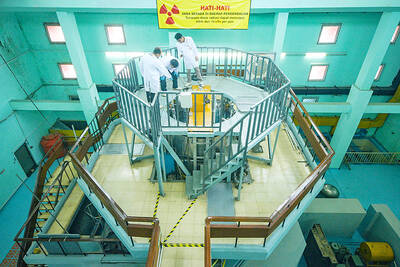A brutal war of words has broken out between the two major parties here over violence committed by youths with immigrant backgrounds, and neither side is backing down.
German Chancellor Angela Merkel has found herself straddling the divide, caught between her contradictory roles as party leader during a heated regional election campaign and as the head of a delicate coalition government.
The controversy began suddenly late last month, when a 20-year-old Turk and a 17-year-old Greek were caught on videotape severely beating a 76-year-old retiree in the Munich subway. The pensioner's skull was fractured in the attack, which shocked the nation. Far from a brief flare-up, the political battle over crime, punishment and ethnicity has only intensified since.
Germany has its difficulties with its immigrants, of which Turks are the largest group, but nothing like the raw conflict seen in other European countries, particularly France. Germany's Nazi past and, as a result, the pains that mainstream German politicians usually take to avoid even the appearance of overt nationalist sentiment, have tended to restrain the kind of debate pursued more openly by far-right parties elsewhere on the continent.
Yet there are signs that could be changing. Roland Koch, a Christian Democrat and the premier in the state of Hesse, home to Frankfurt, seized on the Munich attack as an opportunity to push for tougher penalties for juvenile immigrants who commit crimes. Voters in Hesse and Lower Saxony go to the polls on Jan. 27 in closely watched races for their state parliaments, with Hamburg following next month.
At an election rally on Sunday before thousands of supporters, Koch made the typical candidate's speech, touching on roads and schools, chances missed by his Social Democratic predecessors and the successes of his own government. The loudest cheers came when he turned to his theme of law and order.
"Anyone who raises their fist in this country will experience the combined resistance of the entire civil society of this republic," Koch said. His position struck a chord with Christian Democratic voters.
"The others, their politics are all illusion and Utopia, as if all people are the same," said Herbert Thiel, 66, who had come from the Hessian town of Eschborn for the rally.

Four people jailed in the landmark Hong Kong national security trial of "47 democrats" accused of conspiracy to commit subversion were freed today after more than four years behind bars, the second group to be released in a month. Among those freed was long-time political and LGBTQ activist Jimmy Sham (岑子杰), who also led one of Hong Kong’s largest pro-democracy groups, the Civil Human Rights Front, which disbanded in 2021. "Let me spend some time with my family," Sham said after arriving at his home in the Kowloon district of Jordan. "I don’t know how to plan ahead because, to me, it feels

Poland is set to hold a presidential runoff election today between two candidates offering starkly different visions for the country’s future. The winner would succeed Polish President Andrzej Duda, a conservative who is finishing his second and final term. The outcome would determine whether Poland embraces a nationalist populist trajectory or pivots more fully toward liberal, pro-European policies. An exit poll by Ipsos would be released when polls close today at 9pm local time, with a margin of error of plus or minus 2 percentage points. Final results are expected tomorrow. Whoever wins can be expected to either help or hinder the

North Korea has detained another official over last week’s failed launch of a warship, which damaged the naval destroyer, state media reported yesterday. Pyongyang announced “a serious accident” at Wednesday last week’s launch ceremony, which crushed sections of the bottom of the new destroyer. North Korean leader Kim Jong-un called the mishap a “criminal act caused by absolute carelessness.” Ri Hyong-son, vice department director of the Munitions Industry Department of the Party Central Committee, was summoned and detained on Sunday, the Korean Central News Agency (KCNA) reported. He was “greatly responsible for the occurrence of the serious accident,” it said. Ri is the fourth person

SKEPTICAL: Given the challenges, which include waste disposal and potential domestic opposition, experts warn that the 2032 nuclear timeline is overambitious Indonesia is hoping going nuclear can help it meet soaring energy demand while taming emissions, but faces serious challenges to its goal of a first small modular reactor by 2032. Its first experiment with nuclear energy dates to February 1965, when then-Indonesian president Sukarno inaugurated a test reactor. Sixty years later, Southeast Asia’s largest economy has three research reactors, but no nuclear power plants for electricity. Abundant reserves of polluting coal have so far met the enormous archipelago’s energy needs, but “nuclear will be necessary to constrain the rise of and eventually reduce emissions,” said Philip Andrews-Speed, a senior research fellow at the